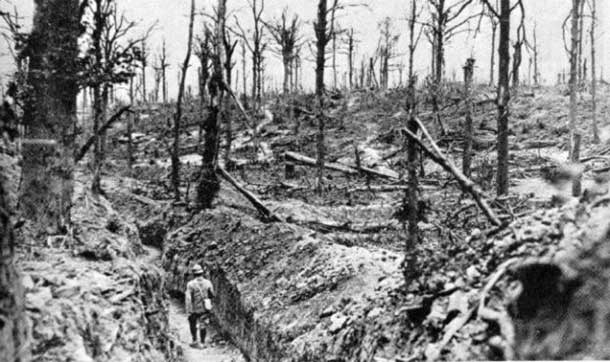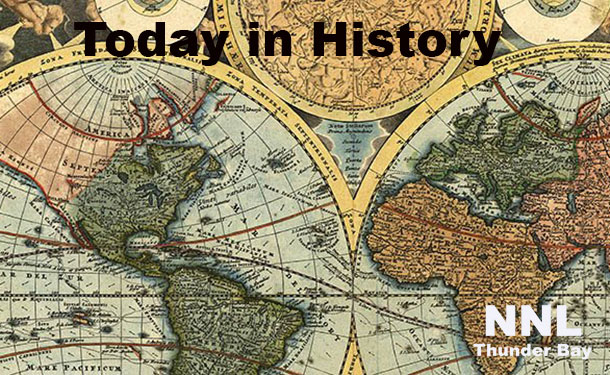
THUNDER BAY – HISTORY – January 10, the day in history. It was on January 10 in 1920 that the Treaty of Versailles came into effect putting an official end to World War One, the war to end all wars.
By 1939, the Second World War started, and in many ways the road to that war was written in the Treaty of Versailles.
It was also on January 10 in 1946 that the first meeting of the General Assembly of the United Nations met with fifty-one nations present.
After a week of horrific murders in Paris, France at the hands of terrorists, claiming they represent religious beliefs of Islam, looking at the past and seeing how efforts toward peace have been seen over the years, it is certain that on our little green and blue planet there is still a lot of work that must be done in order to finally achieve lasting world peace.
Significant Events on January 10
- 49 BC – Julius Caesar crosses the Rubicon, signaling the start of civil war.
- 9 – The Western Han Dynasty ends when Wang Mang claims that the divine Mandate of Heaven called for the end of the dynasty and the beginning of his own, the Xin Dynasty.
- 69 – Lucius Calpurnius Piso Licinianus is appointed by Galba as deputy Roman Emperor.
- 236 – Pope Fabian succeeds Anterus to become the twentieth pope of Rome.
- 1072 – Robert Guiscard conquers Palermo.
- 1475 – Stephen III of Moldavia defeats the Ottoman Empire at the Battle of Vaslui.
- 1645 – Archbishop William Laud is beheaded at the Tower of London.
- 1776 – Thomas Paine publishes his pamphlet Common Sense.
- 1791 – The Siege of Dunlap’s Station begins near Cincinnati during the Northwest Indian War.
- 1806 – Dutch settlers in Cape Town surrender to the British.
- 1810 – Napoleon Bonaparte divorces his first wife Joséphine.
- 1861 – American Civil War: Florida secedes from the Union.
- 1863 – The London Underground, the world’s oldest underground railway, opens between London Paddington station and Farringdon station.
- 1870 – John D. Rockefeller incorporates Standard Oil.
- 1901 – The first great Texas oil gusher is discovered at Spindletop in Beaumont, Texas.
- 1916 – World War I: In the Erzurum Offensive, Russia defeats the Ottoman Empire.
- 1920 – The Treaty of Versailles takes effect, officially ending World War I.
- 1922 – Arthur Griffith is elected President of the Dáil Éireann.
- 1923 – Lithuania seizes and annexes Memel.
- 1927 – Fritz Lang’s futuristic film Metropolis is released in Germany.
- 1929 – The Adventures of Tintin, one of the most popular European comic books, is first published in Belgium.
- 1941 – World War II: The Greek army captures Kleisoura.
- 1946 – The first General Assembly of the United Nations opens in London. Fifty-one nations are represented.
- 1946 – The United States Army Signal Corps successfully conducts Project Diana, bouncing radio waves off the moon and receiving the reflected signals.
- 1954 – BOAC Flight 781, a de Havilland DH.106 Comet 1, explodes and falls into the Tyrrhenian Sea killing 35 people.
- 1962 – Apollo program: NASA announces plans to build the C-5 rocket launch vehicle. It became better known as the Saturn V Moon rocket, which launched every Apollo Moon mission.
- 1972 – Sheikh Mujibur Rahman returns to the newly independent Bangladesh as president after spending over nine months in prison in Pakistan.
- 1981 – Salvadoran Civil War: The FMLN launches its first major offensive, gaining control of most of Morazán and Chalatenango departments
- 1984 – Holy See–United States relations: The United States and Holy See (Vatican City) re-establish full diplomatic relations after almost 117 years, overturning the United States Congress’s 1867 ban on public funding for such a diplomatic envoy.
- 1985 – Sir Clive Sinclair launches the Sinclair C5 personal electric vehicle, which became a notorious commercial failure and later a cult collector’s item.
- 1985 – Sandinista Daniel Ortega becomes president of Nicaragua and vows to continue the transformation to socialism and alliance with the Soviet Union and Cuba; American policy continues to support the Contras in their revolt against the Nicaraguan government.
- 1990 – Time Warner is formed by the merger of Time Inc. and Warner Communications.
- 1999 – Sanjeev Nanda kills three policemen in New Delhi, India with his car, an act for which he was later acquitted, resulting in a sharp drop in public confidence in the Indian legal system.
- 2005 – A mudslide occurs in La Conchita, California, killing 10 people, injuring many more and closing U.S. Route 101, the main coastal corridor between Los Angeles and San Francisco for 10 days.
- 2007 – A general strike begins in Guinea in an eventually successful attempt to get President Lansana Conté to resign.
- 2011 – 2010–2011 Queensland floods: Torrential rain in the Lockyer Valley region of South East Queensland, Australia causes severe flash flooding, killing 9 people.
- 2012 – A bombing in Khyber Agency, Pakistan, kills at least 30 people and 78 others injured.
- 2013 – More than 100 people are killed and 270 injured in several bomb blasts in Pakistan.


